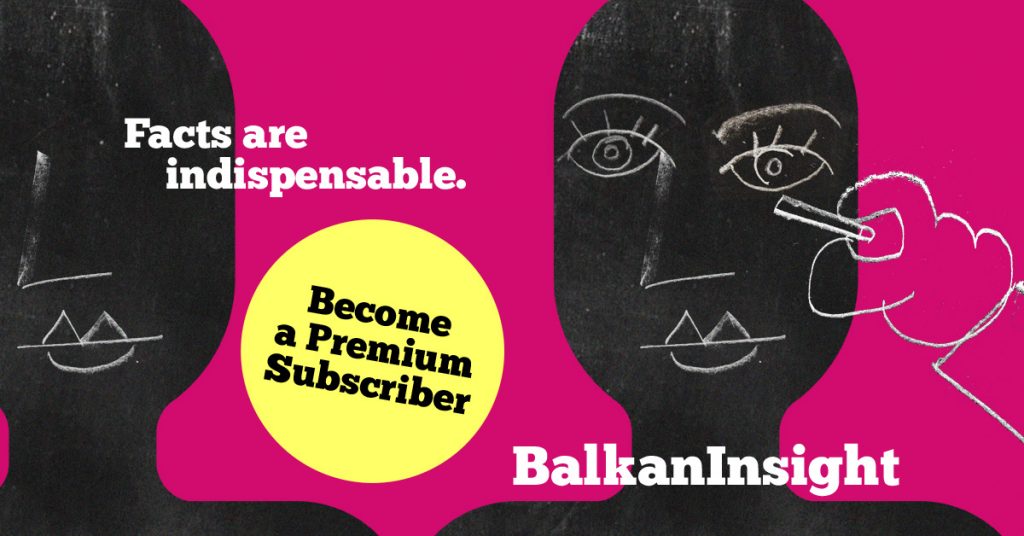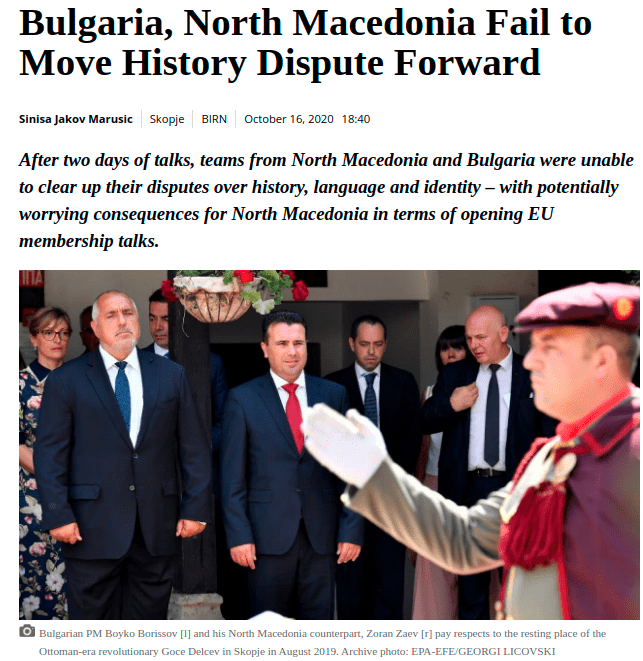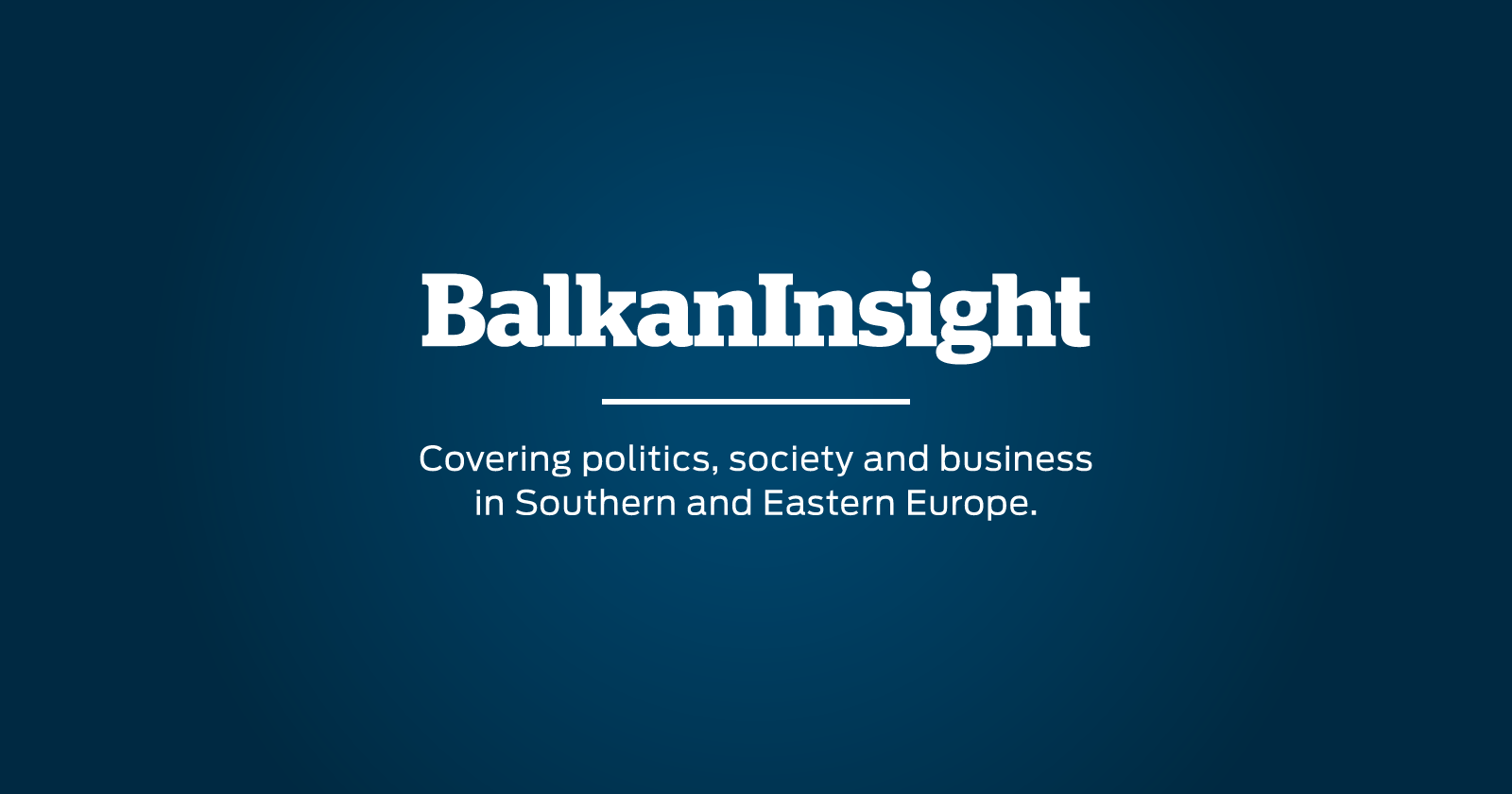Balkan Insight is one of the largest if not the largest online media publications that focus on the Balkan region. Admittedly, I and other writers for Bulgaria Business Insider use this news website as a source of information. In this article, we will be would aim to highlight the failure of Balkan Insight to address historical revisionism in North Macedonia.

Historical Backstory
To give a backstory, there is currently an ongoing dispute going on between two Balkan countries, North Macedonia and Bulgaria. There are many aspects of this dispute such as language, minority rights and even infrastructure. However, the name hurdle in this dispute is history.
The historical debate to put it in layman’s terms is about the emergence of a new ethnic group known as the Macedonians. A small number of Slavic people began to identify as ethnic Macedonians in the mid/late 19 century and early 20th century. At that time, the majority of Slavs in modern-day North Macedonia identified as Bulgarians.
What is today, North Macedonia was eventually annexed to Serbia following the First Balkan War in 1912. During that period of time, the Serbs pursued relentless Serbianization which saw what was at the time the Bulgarian language banned as well as the celebration of the Ilinden-Preobrazhenie Uprising.
The attempts at Serbianization were ultimately a failure and are a major reason behind why the Ohrid–Debar Uprising occurred. This called for a change in approach, Macedonism had existed before the Serbs annexed Macedonia or South Serbia as they called it initially. However, there was an idea being pushed by Serbian intellectuals such as Stojan Novaković who famously said:
| “Since the Bulgarian idea, as everyone knows, has deep roots in Macedonia, I think it is almost impossible to be completely shaken by bringing only the Serbian idea against it. This idea, I am afraid, would not be able to push out the Bulgarian idea as a pure and bare opposite, and for this reason the Serbian idea would be aided by some ally who would be firmly against Bulgarianism and who would contain elements, which can attract the people and the people’s feelings to it, separating it from Bulgarianism. I see this ally in Macedonianism or in certain wisely set borders, a reflection of the Macedonian dialect and the Macedonian specifics. There is nothing more contrary to the Bulgarian tendencies than this – the Bulgarians cannot find themselves in a more irreconcilable position with anyone than Macedonianism.“ |
ISBN 954-8475-08-1 , 1888.
For many Slavs in Macedonia, it was understandably easier to adopt a Macedonian ethnic identity if it meant that they would be less repressed by the Serbian authorities. The politics of Macedonism were subsequently used to create a rift between the population of Macedonia and Bulgaria.
In 1934, the Comintern issued a resolution that recognized the Macedonian ethnic identity and Macedonian language. Following the Second World War, which saw another attempt by Bulgaria to reclaim what it saw as its ‘rightful’ territory. Tito, the new authoritarian leader of Yugoslavia, along with his comrades, decided to put a permanent end to the ‘Bulgarian problem’ in the newly established People’s Republic of Macedonia (name later changed to the Socialist Republic of Macedonia in 1963).
It is not possible to estimate how many people still identified as Bulgarians in Macedonia after the Second World War. It will be ignorant and factually wrong to state that everyone identified as Bulgarian in Macedonia following over 30 years of multiple generations growing up in Serbia. A period during which non-Serbian Slavic identity was repressed. Regardless, there was still a sizeable part of the population who either identified as Bulgarian or just had Bulgarian sympathies.
This saw what is known as Bloody Christmas in 1945 during which hundreds of people that identified as Macedonian Bulgarians or simply were believed to have pro-Bulgarian sympathies were called. Furthermore, the Law for the Protection of Macedonian National Honour in 1944 was passed which made it illegal to identify yourself as Bulgarian and speak Bulgarian in the People’s Republic of Macedonia. According to some estimates, up to 100,000 people were prisoned for various periods of time and 1,260 people were killed due to the law. The law remained in effect until 1991, which was the year that Macedonia gained its independence.
And of course, history was fabricated, in order to remove or hide any Bulgarian historical and cultural presence in the territory.
To this day, none of these issues have been adequately addressed in North Macedonia, instead, they are played down by hypotheses such as that no Bulgarians were repressed. But that instead the individuals who were killed and imprisoned were targeted by Yugoslavian authorities become they wanted an independent Macedonia.
Balkan Insight’s Lack Of Objectivity
The lack of objectivity on such a lively topic in the Balkan region is shocking, especially when you note the number of articles published by BI on the argument between the two countries. Out of the 13 news articles that we analyzed about the topic, 11 were written solely by Macedonian journalist Sinisa Jakov Marusic while the rest are co-written with either Martin Dimitrov or Svetoslav Todorov. Both of whom are Bulgarian. As well as one article by Dimitar Bechev, however, this was published in 2017 way before the dispute came to the forefront.
In none of these articles is the blatant historical falsification going on in North Macedonia. In many of the articles, the issue is presented as some kind of silly argument. When this is actually not the case. Of course, the authors, particularly Sinisa Jakov Marusic may hide behind the veil of journalistic objectivity. At the same time, there is no thorough analysis or illustration of the issue, it is also the journalist’s job to inform.
Right after the Bulgarian veto of North Macedonia’s accession to the EU in November 2020, there were a number of opinion articles posted on Balkan Insight.
The first one was titled ‘Bulgaria’s Blackmail of North Macedonia Undermines Core European Values’ from Tomica Stojanovikj who is a Bosnia-based Macedonian youth activist. This article tries to play on the heartstrings of the readers and downplays the historical dispute between the two countries. Furthermore, he tries to create the impression that disputes between countries about their origins is commonplace, citing Gerald Knaus’ statement about Austria and Germany. You cannot compare Austria with North Macedonia, Austria is a modern country where society has the ability to look at history in an objective manner without any nationalism. In Austria, government-sponsored historians and history books do not falsify the ethnic identity of Germans into Austrians or try to fabricate a two-millennium continuity.

Stojanovikj also quotes Knaus again, “Bulgaria and North Macedonia to agree to differ on their views of history.”. The issue here is again misrepresented, Bulgaria has historical disputes with Serbia for example however this is not an issue between the two countries, instead, minority rights are. Why is this? The reason is that in Serbia there is no fabrication or manipulation of the actual facts. It is okay to differ on views and that is how there is progress. However, why in North Macedonia is every historical to do with Bulgaria erased? For example, The First Bulgarian Empire is known as Samuel’s Kingdom. Or why is it not mentioned in Macedonian school textbooks that revolutionaries such as Gotse Delchev and Dame Gruev were Bulgarian teachers and self-identified as Bulgarians? It is fine to differ in your views, debate is good, but to have a healthy debate all of the facts even the ones that you don’t like need to be known to everyone in North Macedonia. And this is just a small part of the issue, North Macedonia is yet to recognize the massacres of ethnic Bulgarians, to this day they are either entirely denied or the ethnic identity of those killed is changed so it is not Bulgarian.
The second article is titled ‘Bulgaria May Come to Regret its Role as Balkan Bully’ by Skopje-based political consultant Harald Schenker. The article is essentially a rant with a number of factual inaccuracies such as the statement “I live in a place – North Macedonia – that has had its share of bully action. It started with not being recognized as a country by its neighbors, especially Greece and Bulgaria.” In reality, Bulgaria was the first country in history to recognize independent Macedonia. We have spoken to multiple sources who have said that they have emailed Balkan Insight about the factual inaccuracy. Their emails were read however no action was taken to make any corrections.
The article tries to shift the blames to the veto on the failings of the ruling Bulgarian coalition of GERB and IMRO as the real reason behind the veto as Bulgaria is looking for someone to portray as an enemy and to blame. Furthermore, again the issue is misrepresented as if the Bulgarian government just found out about the ‘historical differences’ and decided to use it as a reason to block North Macedonia. The author seems to forget about the thousands of Bulgarian soldiers who martyred for the region of Macedonia, the tens of thousands of refugees that fled to Bulgaria, and the brutal policy of Macedonization in the modern-day Blagoevgrad District in Bulgaria. So this argument is pretty nonsensical.
Mr. Schenker has the courtesy of ending his article with a ‘simple truth’ that reads “The simple truth is that bullies never win in the end; even worse for their ego, they are instead remembered only for what they are.” Since Mr. Schenker, seems to have an affinity for simple truths, then he should also be aware that the truth also comes out. This is key here, for North Macedonia, a country that has decided to inherit the mantle of historical revisionism and cultural appropriation from the Yugoslavs.
Despite this flurry of opinion articles from pro-Macedonian individuals, there were no opinion articles posted from anyone offering the other side of the story. We understand, that as of writing this article BIRN (the organization behind Balkan Insight) does not have offices in Bulgaria, however sending an email to a few politicians or university professors is not that time-consuming.
The ‘Indispensable Facts’

As it says in the Balkan Insight header ‘facts are indispensable’, the historical dispute between North Macedonia and Bulgaria is not some stupid dispute. Its roots go deep from Yugoslav state-sponsored terror and historical fabrications, in order to divide and conquer.
Although Mr. Schenker may say on Twitter, “… when have there ever been “objective historic facts”? history is always subject to interpretation and always disputed. always.”. The word history, originating from the Greek word ‘historia’ means “inquiry; knowledge acquired by investigation”. Historians rely on archaeological evidence and writing in order to shape and defend their views.
North Macedonia’s history should not be based on hiding facts such as the name of the Bulgarian Men’s High School of Thessaloniki which in North Macedonia is known as Thessaloniki Boys’ High School “St. Cyril and Methodius”. Or certain statutes of the IMRO are kept hidden just because the word ‘Bulgarian’ is there.
Why are certain facts about the persecution of important figures of Macedonian history such as Panko Brashnarov and Metodija Andonov-Čento kept hidden from the wider society? It is ironic that certain Macedonian nationalists claim to respect historical figures such as Gotse Delchev yet desecrating his memory by falsifying his life. Facts such as that Delchev went to a Bulgarian church, schools and army should not be an issue
Naivety, to put it simply, is to expect good relations between North Macedonia and Bulgaria if the historical manipulations and erasure are not sorted out. Yes, there is a minority Bulgarian nationalists in Bulgaria that don’t, and most likely never will accept a separate ethnic Macedonian identity or language. Those that you have to win over are the general public, and North Macedonia will not win them over by denying the repression against Bulgarians as well as appropriating their history and culture. You cannot have it both ways.
It is not known what the journalists at Balkan Insight are thinking or expecting by refusing to discuss this issue. I do not personally agree with everything that Harald Schenker and Tomica Stojanovikj have to say, however, I probably do agree that we need more honest and objective discussion. Too many people in both countries, see history as some kind of competition where it is okay to lie and steal, instead, both people should sit down and take the history for what it is based on the evidence whether we like it or not. History is not supposed to be all triumphant and majestic, it is more important to learn from the mistakes and regrets such as the estimated 11,343 Jews deported to Nazi Germany’s concentration camps by Bulgaria during WW2 and the potentially thousands of Bulgarians/Bulgarophiles killed in modern-day North Macedonia.
It is important for North Macedonia to overcome historical manipulation and hate from Yugoslav times while many Bulgarians need to have a less brief view of the development of the ethnic Macedonian identity and stop living in the past.
Balkan Insight and BIRN are playing around with the issue. Bulgaria is not right in all of its arguments or statements, but blaming only Bulgaria is a waste of time as the issue is much more complicated than that. Balkan Insight has to make a bigger effort to present both sides as well as to publish what may be uncomfortable for Bulgarians and Macedonians. Regardless of the spin that some will attempt, history is not fiction, it is based on the most reliable facts and evidence left in existence for us to use. Balkan Insight may claim that it finds facts indispensable, however, actions speak louder than words. This article should not be misinterpreted as a request for a bias for Bulgaria, we actually want the opposite, we want a better representation by BI of the historical evidence regardless of whose side that evidence supports. In order for the public in both countries to have better informed historical views that are less based on hate and prejudice.
Sources:
https://en.wikipedia.org/wiki/Balkan_Wars
https://en.wikipedia.org/wiki/Ohrid%E2%80%93Debar_uprising
https://en.wikipedia.org/wiki/North_Macedonia#Kingdom_of_Serbia
https://en.wikipedia.org/wiki/Ilinden%E2%80%93Preobrazhenie_Uprising
Ilinden left a durable trace in popular memories. It was commemorated by the diaspora in Bulgaria and all factions within the IMARO. A veteran organization was established in 1921…In the late 1930s, communists in Vardar Macedonia organized commemorations, defying the ban by the Serb authorities. Celebrations were institutionalized following the region’s annexation by Bulgaria in April 1941. For more see: Dimitar Bechev, (2009) Historical dictionary of the Republic of Macedonia, Scarecrow Press, p. 96, ISBN 978-0-8108-5565-6.
Резолюция о македонской нации (принятой Балканском секретариате Коминтерна” – Февраль 1934 г, Москва
https://en.wikipedia.org/wiki/Macedonian_nationalism#cite_note-69
https://en.wikipedia.org/wiki/Law_for_the_Protection_of_Macedonian_National_Honour
https://en.wikipedia.org/wiki/Stojan_Novakovi%C4%87
https://en.wikipedia.org/wiki/Resolution_of_the_Comintern_on_the_Macedonian_question
https://en.wikipedia.org/wiki/Socialist_Republic_of_Macedonia
https://en.wikipedia.org/wiki/Accession_of_North_Macedonia_to_the_European_Union
https://en.wikipedia.org/wiki/Bloody_Christmas_(1945)
https://en.wikipedia.org/wiki/Samuel_of_Bulgaria
https://en.wikipedia.org/wiki/First_Bulgarian_Empire
https://en.wikipedia.org/wiki/Dame_Gruev
https://en.wikipedia.org/wiki/Gotse_Delchev
https://en.wikipedia.org/wiki/Panko_Brashnarov
https://en.wikipedia.org/wiki/Metodija_Andonov-%C4%8Cento
https://en.wikipedia.org/wiki/Bulgarian_Men’s_High_School_of_Thessaloniki

